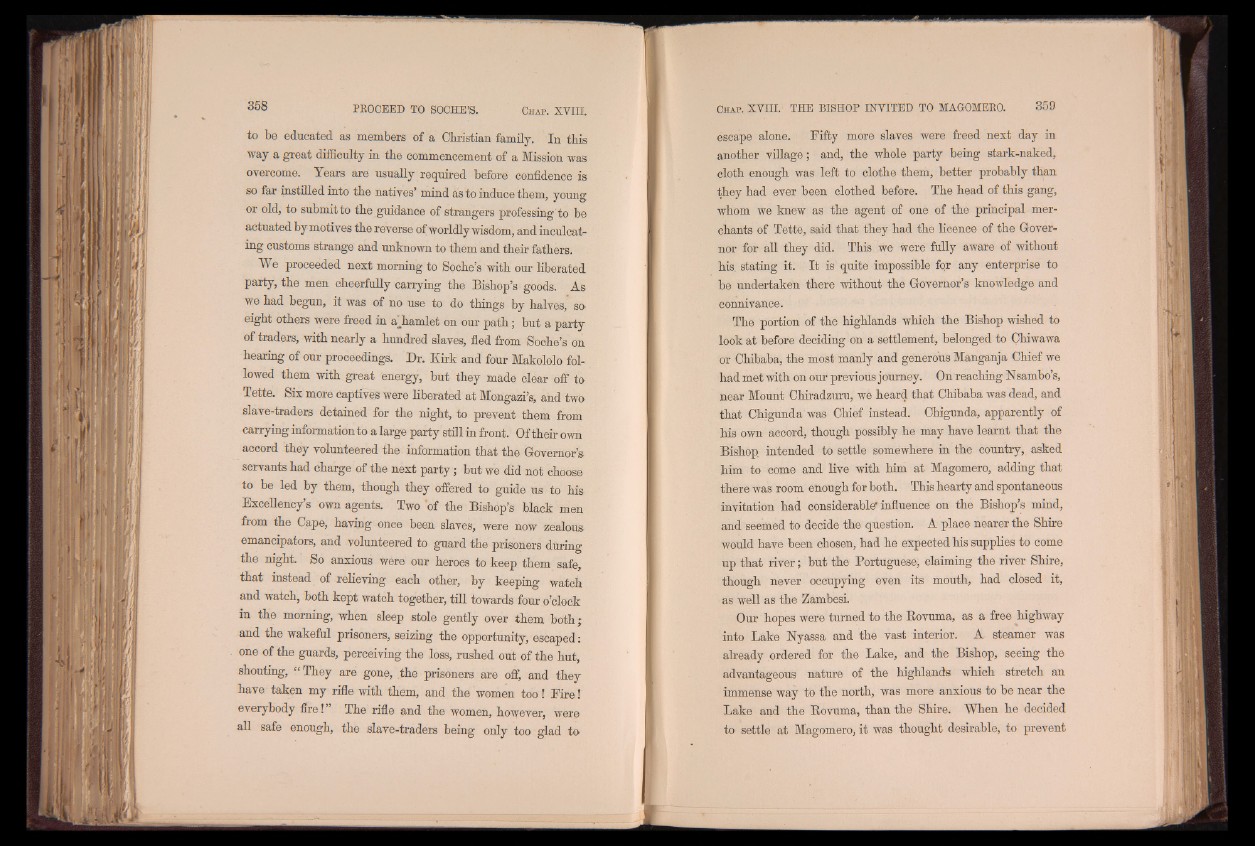
to be educated as members of a Christian family. In this
way a great difficulty in the commencement of a Mission was
overcome. Tears are usually required before confidence is
so far instilled into the natives’ mind Us to induce them, young
or old, to submit to the guidance of strangers professing to be
actuated by motives the reverse of worldly wisdom, and inculcating
customs strange and unknown to them and their fathers.
We proceeded next morning to Soche’s with our liberated
party, the men cheerfully carrying the Bishop’s goods. As
we had begun, it was of no use to do things by halves, so
eight others were freed in ajhamlet on our p a th ; but a party
of traders, with nearly a hundred slaves, fled from Soche’s on
hearing of our proceedings. Dr. Kirk and four Makololo followed
them with great energy, but they made clear off to
Tette. Six more captives were liberated at Mongazi’s, and two
slave-traders detained for the night, to prevent them from
carrying information to a large party still in front. Of their own
accord they volunteered the information that the Governor’s
servants had charge of the next party; but we did not choose
to be led by them, though they offered to guide us to his
Excellency’s own agents. Two of the Bishop’s black men
from the Cape, having once been slaves, were now zealous
emancipators, and volunteered to guard the prisoners during
the night. So anxious were our hero® to keep them safe,
that instead of relieving each other, by keeping watch
and watch, both kept watch together, till towards four o’clock
in the morning, when sleep stole gently over them both;
and the wakeful prisoners, seizing the opportunity, escaped:
one of the guards, perceiving the loss, rushed out of the hut,
shouting, “ They are gone, the prisoners are off, and they
have taken my rifle with them, and the women too! Fire!
everybody fire! The rifle and the women, however, were
all safe enough, the slave-traders being only too glad to
escape alone. Fifty more slaves were freed next day in
another village; and, the whole party being stark-naked,
cloth enough was left to clothe them, better probably than
they had ever been clothed before. The head of this gang,
whom we knew as the agent of one of the principal merchants
of Tette, said that they had the licence of the Governor
for all they did. This we were fully aware of without
his. stating it. It is quite impossible for any enterprise to
be undertaken there without the Governor’s knowledge and
connivance.
The portion of the highlands which the Bishop wished to
look at before deciding on a settlement, belonged to Chiwawa
or Chibaba, the most manly and generous Manganja Chief we
had met with on our previous journey. On reaching ISTsambo’s,
near Mount Chiradzuru, we heard that Chibaba was dead, and
that Chigunda was Chief instead. Chigunda, apparently of
his own accord, though possibly he may have learnt that the
Bishop, intended to settle somewhere in the country, asked
him to come and live with him at Magomero, adding that
there was room enough for both. This hearty and spontaneous
invitation had considerable* influence on the Bishop’s mind,
and seemed to decide the question. A place nearer the Shire
would have been chosen, had he expected his supplies to come
up that river; but the Portuguese, claiming the river Shire,
though never occupying even its mouth, had closed it,
as well as the Zambesi.
Our hopes were turned to the Rovuma, as a free highway
into Lake Nyassa and the vast interior. A steamer was
already ordered for the Lake, and the Bishop, seeing the
advantageous nature of the highlands which stretch an
immense way to the north, was more anxious to be near the
Lake and the Rovuma, than the Shire. When he decided
to settle at Magomero, it was thought desirable, to prevent